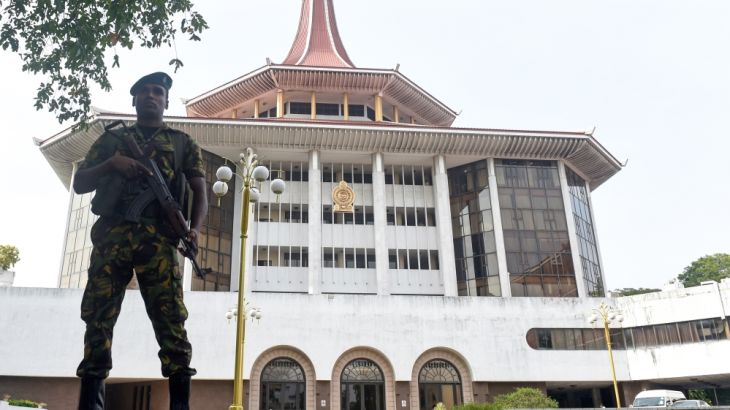Sri Lanka’s Supreme Court overturns sacking of parliament
In landmark ruling, top court says President Maithripala Sirisena’s dissolution of parliament is unconstitutional.

Colombo, Sri Lanka: Sri Lanka‘s Supreme Court has ruled President Maithripala Sirisena’s decision to dissolve parliament and hold snap elections was unconstitutional, dealing a major blow to the embattled leader in his feud with a deposed prime minister.
A seven-judge bench unanimously ruled on Thursday that Sirisena cannot sack the 225-member House before four-and-a-half years have passed since its election.
The much-anticipated ruling came seven weeks into a political crisis, which began on October 26 when Sirisena fired Prime Minister Ranil Wickremesinghe and replaced him with Mahinda Rajapaksa, a controversial former president.
Rajapaksa, however, could not muster a majority in parliament, and Sirisena on November 9 dissolved the legislature two years ahead of schedule.
The Supreme Court, responding to a court complaint against the moves, issued an interim ruling suspending Sirisena’s decree and restoring parliament, which went on to pass two no-confidence motions against Rajapaksa.
|
|
The court’s final verdict on Thursday raises the possibility of Wickremesinghe being reinstated as prime minister.
In a Twitter post, the sacked leader said he hoped Sirisena will “promptly respect the judgement of the courts”.
“The legislature, judiciary, and the executive are equally important pillars of a democracy and the checks and balances that they provide are crucial to ensuring sovereignty of its citizens,” he said.
Supporters of his United National Party (UNP) celebrated the verdict, lighting firecrackers outside the Supreme Court complex.
Negotiations
There was no immediate comment from Sirisena or Rajapaksa.
But Rajapaksa’s son, Namal, said they respected the Supreme Court’s decision, despite “reservations regarding its interpretation”.
He added in a Twitter post, “We will continue to stand alongside those calling for a parliamentary election, without which there is no real justice.”
Alan Keenan, Sri Lanka project director at the International Crisis Group, told Al Jazeera that Thursday’s ruling was a “welcome one” and indicated “the resilience of Sri Lanka’s judiciary and its independence from executive control.”
But the judgment does not resolve the crisis, he said, as Sirisena has repeatedly refused to reappoint Wickremesinghe.
On Wednesday, the parliament voted overwhelmingly to demand the UNP leader be reinstated as prime minister, but the president has not yet commented on that motion.
The former allies fell out dramatically over economic policy and what Sirisena said was the involvement of a Wickremesinghe ally in an alleged assassination plot against him.
Keenan said political negotiations were key to resolving the crisis.
“The outlines of a possible deal have been clear for a while: restoration of Ranil Wickremesinghe as prime minister in exchange for parliament agreeing to dissolve itself and go to fresh elections,” he said.
The “biggest loser” in the nearly two months of political upheaval was Sirisena, Keenan continued, adding, “It is hard to see how [Sirisena] can salvage a political future for himself.”
Asanga Welikala, a Sri Lankan law professor at the University of Edinburgh, also echoed the call for negotiations.
He said he was sceptical of a swift resolution to the crisis as Sirisena has “so far not shown any respect for the Constitution or parliament”.
“Moreover, it remains to be seen how Mahinda Rajapaksa will react,” he said. “Their behaviour does not give rise to confidence that they will easily or quietly withdraw from the attempted power grab. So it remains to be seen if the crisis will end any time soon.”
The protracted crisis has sparked international concern and hit the country’s economy.
The country’s currency – the Sri Lankan rupee – fell to a record low of 177.20 to the dollar in November, and foreign investors have pulled out more than 30bn rupees ($169.5m) since the crisis began, according to Reuters news agency.
The travel industry, which makes up about five percent of Sri Lanka’s $87bn economy, has also reported cancellations by both business and leisure visitors.
Zaheena Rasheed reported from Doha. Rathindra Kuruwita reported from Colombo.